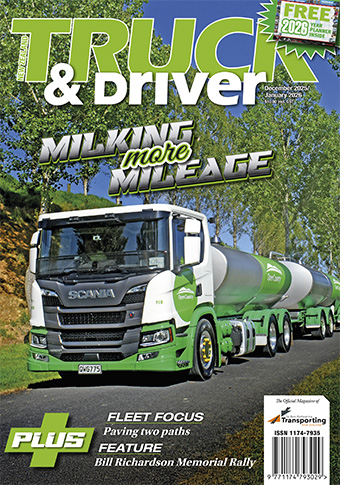Ia Ara Aotearoa Transporting New Zealand News


Emissions reduction with the tools we’ve got
Gains can be made right now to reduce greenhouse gas (GHG) emissions from road freight transport, Ia Ara Aotearoa Transporting New Zealand chief executive Nick Leggett says.
In a comprehensive submission to the Ministry of Business, Innovation and Employment, Transporting NZ says the government should be more decisive and fast-acting in enabling tangible progress on reducing GHG emissions.
Says Leggett: “Instead of waiting for the perfect heavy truck to be produced that meets the Government’s view of decarbonisation (ie EVs or hydrogen) – which could be years away and is still largely in fantasy land – the Government could be acting now, with solutions that already exist to reduce emissions.
“Acting with what we have now will impact what measures need to be taken in future and will enable existing trucks to be used, rather than operators being forced to mothball them at some point, which is surely a better overall environmental solution.”
The public conversation around completely ditching fossil fuels currently relies on two possible alternatives – hydrogen and EV battery technology.
...Gains can be made right now to reduce greenhouse gas (GHG) emissions from road freight transport, Ia Ara Aotearoa Transporting New Zealand chief executive Nick Leggett says.
In a comprehensive submission to the Ministry of Business, Innovation and Employment, Transporting NZ says the government should be more decisive and fast-acting in enabling tangible progress on reducing GHG emissions.
Says Leggett: “Instead of waiting for the perfect heavy truck to be produced that meets the Government’s view of decarbonisation (ie EVs or hydrogen) – which could be years away and is still largely in fantasy land – the Government could be acting now, with solutions that already exist to reduce emissions.
“Acting with what we have now will impact what measures need to be taken in future and will enable existing trucks to be used, rather than operators being forced to mothball them at some point, which is surely a better overall environmental solution.”
The public conversation around completely ditching fossil fuels currently relies on two possible alternatives – hydrogen and EV battery technology.
Hydrogen, regardless of how it is produced, is not energy-efficient, says Leggett: The end product is a gas that has to be converted back into electricity. During that process about half of the remaining energy is lost. NZ also lacks the infrastructure to distribute it, and vehicle manufacturers have to reach a certain level of scale to make the production of hydrogen fuel cells cost-effective.
With EV battery technology, while it is becoming cheaper, smaller and lighter, the size and weight of a battery that could power a long-haul freight network is still a major issue.
Encouragingly, Ministry of Transport Chief Science Advisor Simon Kingham was recently quoted as saying biofuels can be used to reduce emissions in the short-term, while research and work continues on a longterm, emissions-free replacement for diesel in our freight fleet.
Says Leggett: “Finally, we are seeing some sense out of Government. For a long time now, Transporting NZ has been pointing out that biodiesel is a solution that could and should be available.
“It has been used in parts of Europe for several years and can, with minimal disruption, be used in the current generation of heavy vehicles.
“There are a number of other practical things that can be done to help the industry reduce its emissions while we wait for an appropriate zero-carbon solution. These include the rollout of fuel-efficient driver training, greater reduction of aerodynamic drag in vehicle design, speed management, tyre pressure management, and scheduling and despatch software solutions to reduce journeys.”
And he adds: “The industry has suggested such measures in
numerous discussion papers and we are getting increasingly frustrated that, rather than go after some tangible returns, this Government appears to continue with its flawed policy idealisms in search of an unobtainable nirvana.”
Leggett says the best solution may be electric, hydrogen, biofuels, or a combination of all three, plus other solutions. But believes that a full electric and/or hydrogen truck fleet, with reliable energy supply throughout the country, is a long way off.
“We believe the Government should provide support to industry-wide and sector-led initiatives, rather than its tendency to develop its own ideas or support niche products. This is not an area where we can put all our eggs in one basket.
“The vast majority of expertise on the feasibility and viability of transport innovation lies within the industry and transport sector leadership groups. Government does not understand how the private sector operates.
“We welcome ongoing discussion with the Government and its advisors on reducing emissions. We believe we can add considerable technical and policy expertise to Government thinking and we urge it to work more closely with us so we can get into action much more quickly and reduce emissions.”



 + EQUIPMENT GUIDE - FREE
+ EQUIPMENT GUIDE - FREE
